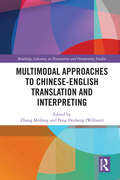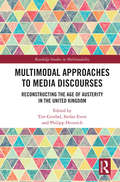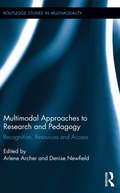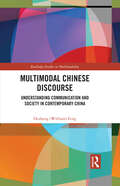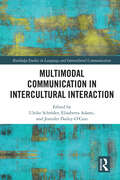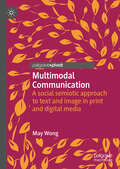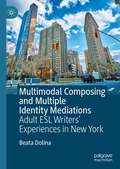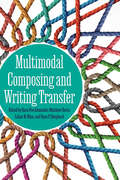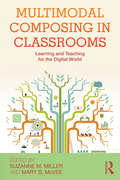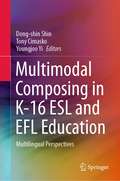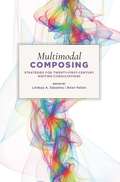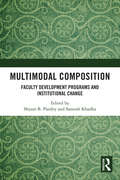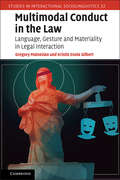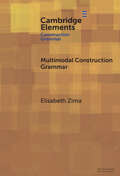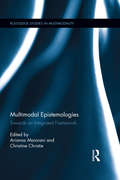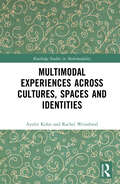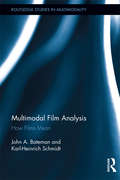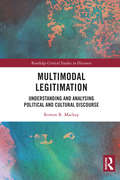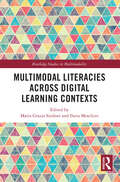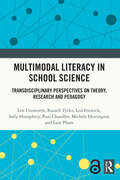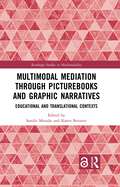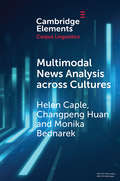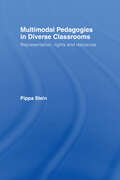- Table View
- List View
Multimodal Approaches to Chinese-English Translation and Interpreting (Routledge Advances in Translation and Interpreting Studies)
by Zhang Meifang Feng DezhengNowadays, discourse analysis deals with not only texts but also paratexts and images, so do translation and interpreting studies. Therefore, the concept of "multimodality" has become an increasingly important topic in subject areas of linguistics, discourse analysis and translation studies. However, up to now, not much research has been done systematically on multimodal factors in translation and interpreting, even less in exploring research models or methodologies for multimodal analysis in translation and interpreting. This book aims to introduce and apply different theories of the multimodal discourse analysis to the study of translations, with case studies on Chinese classics such as the Monkey King, Mulan and The Art of War, as well as on interpretations of up-to-date issues including the Chinese Bell and Road Initiative and Macao tourism. The chapters reflect the first attempts to apply multimodal approaches to translation and interpreting with a special focus on Chinese-English translations and interpreting. They provide new understandings of transformations in the multimodal translation process and useful reference models for researchers who are interested in doing research of similar kind, especially for those who are interested in looking into translations related to Chinese language, literature and culture.
Multimodal Approaches to Media Discourses: Reconstructing the Age of Austerity in the United Kingdom (Routledge Studies in Multimodality)
by Tim Griebel Stefan Evert Philipp HeinrichMultimodal Approaches to Media Discourses brings together contributions from an interdisciplinary group of scholars on corpus-assisted analyses of multimodal data on austerity discourses in the United Kingdom, which extend and expand on the understanding of austerity but also of the methodologies used to analyse multimodal corpora. The volume demonstrates how the austerity measures introduced in response to global economic and financial crises in recent years can be viewed as being more complexly layered than they appear, not simply reduced to their connections to spending cuts and fiscal debt. The book employs an innovative methodological approach, in which established and emerging scholars from linguistics and computational and social sciences critically reflect on the exact same set of data – multimodal texts and articles from The Guardian and The Daily Telegraph from 2010 to 2016. This framework allows for the exploration of the role of the media in mediating the public’s assessment of austerity and the ideas, actors, emotions, geographies and broader material context which contribute to such perceptions. In so doing, the volume also offers unique insights into systematic analyses to multimodal data which may be applied to other topics and connected with other disciplines. Enhancing our awareness and assessment of austerity in public discourse and of the methodologies to study it, this book is key reading for students and researchers in discourse analysis, corpus linguistics, multimodality, and those working at the intersection of these fields.
Multimodal Approaches to Research and Pedagogy: Recognition, Resources, and Access (Routledge Studies in Multimodality)
by Denise Newfield Arlene ArcherThis book brings together social semiotics, cultural studies, multiliteracies, and other approaches in order to theorize very different learning environments, giving visibility to the modal effect in a range of disciplines. It highlights the ideological nature of discursive practices, examines questions of access, and argues for transformation of these practices, with a constant eye on issues of social justice and equity. Contributors argue that we can harness learners’ representational resources through making these resources visible, and creating less regulated spaces in the curriculum in which they can be used. Examples from primary education through to adult continuing education are used throughout the text.
Multimodal Chinese Discourse: Understanding Communication and Society in Contemporary China (Routledge Studies in Multimodality)
by Dezheng (William) FengThis book helps readers to understand communication and society in contemporary China through systematic analysis of multimodal discourse at the national, institutional, and individual levels. China has undergone profound changes during the past decade or so. Politically, the Chinese government has been more proactive in domestic governance and foreign policies, as manifested in the Chinese Dream campaign and the national image publicity films respectively. Hand-in-hand with the socio-political change is the rapid development of new media, which has been changing how corporates do business, how institutions brand their images, as well as how individuals construct their identities and social relations. These developments have brought about significant changes to the discursive practices at the national, institutional, and individual level, characterized by the extensive use of multimodal resources and distinct promotional purposes. Feng systematically investigates and discusses the new discursive features in relation to relevant socio-cultural contexts. The analysis and discussion provide researchers with a social semiotic perspective on various aspects of communicative and social changes in contemporary China. The book also contributes to the growing field of multimodality by developing a set of cross-disciplinary analytical frameworks to deal with complex discourse forms in print media, moving images, and new media. The research findings provide a unique Chinese perspective on a broad spectrum of issues such as discursive governance, nation branding, university marketization, and identity performance. The book is relevant not only to discourse analysis and multimodality, but also to other disciplines which will benefit from a systematic understanding of Chinese discourse, such as cultural studies, communication studies and area/China studies.
Multimodal Communication in Intercultural Interaction (Routledge Studies in Language and Intercultural Communication)
by Jennifer Dailey-O’Cain Ulrike Schröder Elisabetta AdamiThis collection brings together a range of perspectives on multimodal communication in intercultural interaction, bridging cognitive, social, and functional approaches towards promoting cross-disciplinary dialogues and taking research at the intersections of these fields into new directions. The volume assembles conversationalist, socially oriented, cognitive, and sensory approaches in considering culture as a dynamic construct, co-constituted and (re)negotiated among participants in interaction and filtering it through a multimodal lens, drawing on a range of examples, such as educational settings or online video platforms. Each chapter offers a unique perspective on "culture" and "intercultural," while also situating their own definitions of these labels against those of the other chapters. Taken together, the chapters form a fluid conversation on the nature of intercultural encounters in today’s globalizsd world, as digital environments intertwine with the physical mobility of people, encouraging researchers across these fields to adopt a more holistic multimodal perspective to approach intercultural interaction. This book will be of interest to students and scholars in intercultural communication, multimodality, sociolinguistics, cognitive and interactional linguistics, and semiotics.
Multimodal Communication: A social semiotic approach to text and image in print and digital media
by May WongThis book draws on visual data, ranging from advertisements to postage stamps to digital personal photography, to offer a complex interpretation of the different social functions realised by these texts as semiotic artefacts. Framed within the media environment of the city of Hong Kong, the study demonstrates the importance of social context to meaning making and social semiotic multimodal analysis. This book will be of interest to readers in the arts, humanities and social sciences, particularly within the fields of semiotics, visual studies, design studies, media and cultural studies, anthropology and sociology.
Multimodal Composing and Multiple Identity Mediations: Adult ESL Writers' Experiences in New York
by Beata DolinaThis book examines the experiences of adult ESL (English as a Second Language) learners in New York, paying particular attention to the relationship between their professional identities and multimodal composing practices in English classroom. The author uses an (auto-)ethnographic framework to investigate how previously-constructed identities of a professional nature aided the students in the design of multimodal texts including photographs and written material in English. This small-scale study is contextualised in relation to current research in the fields of multimodality, identity construction and teaching methodology, and the author also draws on Kress' theory of visual semiotics. Finally, the book provides detailed descriptions and suggestions for multimodal lessons which could be delivered in ESL classrooms in other settings, including multimodal roleplays, theatre games, and model discussion questions and answers. This book will be of interest to ESL/EFL and TESOL researchers and practitioners, as well as pre-service teachers and MA TESOL students.
Multimodal Composing and Writing Transfer
by Matthew Davis Lilian W. Mina Kara Poe AlexanderMultimodal Composing and Writing Transfer explores transfer across various contexts of multimodal composing, extending the early conversations connecting multimodality to writing. Contributors address how writing transfer theories intersect with multimodal composing and present methods for facilitating transfer across modes and media, offering insight into how writers can learn to compose when they encounter familiar modes in new contexts. Over the past two decades the concepts of multimodal composing and writing transfer have grown and reshaped the nature of writing studies, but rarely have the ways in which these areas overlap been studied. This collection shows how this shift in writing studies has been mutually informative, covering a wider range of contexts for multimodality and writing transfer than just in first-year composition courses. It places composition teaching practices and multimodal research in conversation with learning transfer theory to provide an in-depth examination of how they influence one another. Multimodal Composing and Writing Transfer develops these intersections to connect multimodal composition and writing practices across a wide array of fields and contexts. Scholars across disciplines, postsecondary writing teachers, writing program administrators, writing center directors, and graduate students will find this collection indispensable.
Multimodal Composing in Classrooms: Learning and Teaching for the Digital World
by Suzanne M. Miller Mary B. McVeeTaking a close look at multimodal composing as an essential new literacy in schools, this volume draws from contextualized case studies across educational contexts to provide detailed portraits of teachers and students at work in classrooms. Authors elaborate key issues in transforming classrooms with student multimodal composing, including changes in teachers, teaching, and learning. Six action principles for teaching for embodied learning through multimodal composing are presented and explained. The rich illustrations of practice encourage both discussion of practical challenges and dilemmas and conceptualization beyond the specific cases. Historically, issues in New Literacy Studies, multimodality, new literacies, and multiliteracies have primarily been addressed theoretically, promoting a shift in educators’ thinking about what constitutes literacy teaching and learning in a world no longer bounded by print text only. Such theory is necessary (and beneficial for re-thinking practices). What Multimodal Composing in Classrooms contributes to this scholarship are the voices of teachers and students talking about changing practices in real classrooms.
Multimodal Composing in K-16 ESL and EFL Education: Multilingual Perspectives
by Dong-Shin Shin Tony Cimasko Youngjoo YiThis book offers a comprehensive view of multimodal composing and literacies in multilingual contexts for ESL and EFL education in United States of America and globally. It illustrates the current state of multimodal composing and literacies, with an emphasis on English learners' language and literacy development. The book addresses issues concerning multilinguals' multimodal composing and reflects on what the nexus of multimodality, writing development, and multilingual education entails for future research. It provides research-driven and practice-oriented perspectives of multilinguals' multimodal composing, drawing on empirical data from classroom contexts to elucidate aspects of multimodal composing from a range of theoretical perspectives such as multiliteracies, systemic functional linguistics, and social semiotics. This book bridges the gap among theory, research, and practice in TESOL and applied linguistics. It serves as a useful resource for scholars and teacher educators in the areas of applied linguistics, second language studies, TESOL, and language education.
Multimodal Composing: Strategies for Twenty-First-Century Writing Consultations
by Patrick Anderson Alice Johnston Myatt Russell Carpenter Karen Head Shawn Apostel Jarrod Barben Brandy Bell Blake Sarah Blazer Brenta Blevins Florence Davies Kate Flom Derrick Lauri Dietz Clint Gardner Alyse Knorr Jarret Krone Sohui Lee Joe McCormick Courtnie Morin Molly Schoen James C. W. TrumanMultimodal Composing provides strategies for writing center directors and consultants working with writers whose texts are visual, technological, creative, and performative—texts they may be unaccustomed to reading, producing, or tutoring. This book is a focused conversation on how rhetorical, design, and multimodal principles inform consultation strategies, especially when working with genres that are less familiar or traditional. Multimodal Composing explores the relationship between rhetorical choices, design thinking, accessibility, and technological awareness in the writing center. Each chapter deepens consultants’ understanding of multimodal composing by introducing them to important features and practices in a variety of multimodal texts. The chapters’ activities provide consultants with an experience that familiarizes them with design thinking and multimodal projects, and a companion website (www.multimodalwritingcenter.org) offers access to additional resources that are difficult to reproduce in print (and includes updated links to resources and tools). Multimodal projects are becoming the norm across disciplines, and writers expect consultants to have a working knowledge of how to answer their questions. Multimodal Composing introduces consultants to key elements in design, technology, audio, and visual media and explains how these elements relate to the rhetorical and expressive nature of written, visual, and spoken communication. Peer, graduate student, professional tutors and writing center directors will benefit from the activities and strategies presented in this guide. Contributors: Patrick Anderson, Shawn Apostel, Jarrod Barben, Brandy Ball Blake, Sarah Blazer, Brenta Blevins, Russell Carpenter, Florence Davies, Kate Flom Derrick, Lauri Dietz, Clint Gardner, Karen J. Head, Alyse Knorr, Jarret Krone, Sohui Lee, Joe McCormick, Courtnie Morin, Alice Johnston Myatt, Molly Schoen, James C. W. Truman
Multimodal Composition: Faculty Development Programs and Institutional Change
by Shyam B. Pandey and Santosh KhadkaThis collection explores the role of individual faculty initiatives and institutional faculty development programs in supporting programmatic adoption of multimodal composition across diverse institutional contexts. The volume speaks to the growing interest in multimodal composition in university classrooms as the digital media and technology landscape has evolved to showcase the power and value of employing multiple modes in educational contexts. Drawing on case studies from a range of institutions, the book is divided into four parts, each addressing the needs of different stakeholders, including scholars, instructors, department chairs, curriculum designers, administrators, and program directors: faculty initiatives; curricular design and pedagogies; faculty development programs; and writing across disciplines. Taken together, the 16 chapters make the case for an integrated approach bringing together insights from unique faculty initiatives with institutional faculty development programs in order to effectively execute, support, and expand programmatic adoption of multimodal composition. This book will be of interest to scholars in multimodal composition, rhetoric, communication studies, education technology, media studies, and instructional design, as well as administrators supporting program design and faculty development.
Multimodal Conduct in the Law: Language, Gesture and Materiality in Legal Interaction (Studies in Interactional Sociolinguistics #32)
by Gregory Matoesian Kristin Enola GilbertThe study of language and law has seen explosive growth in the past twenty-five years. Research on police interrogations, trial examination, jury deliberation, plea bargains, same sex marriage, to name a few, has shown the central role of written and oral forms of language in the construction of legal meaning. However, there is another side of language that has rarely been analyzed in legal settings: the role of gesture and how it integrates with language in the law. This is the first book-length investigation of language and multimodal conduct in the law. Using audio-video tapes from a famous rape trial, Matoesian and Gilbert examine legal identity and impression management in the sociocultural performance of precedent, expert testimony, closing argument, exhibits, reported speech and trial examination. Drawing on insights from Jakobson and Silverstein, the authors show how the poetic function inheres not only in language but multimodal conduct generally. Their analysis opens up new empirical territory for both forensic linguistics and gesture studies.
Multimodal Construction Grammar (Elements in Construction Grammar)
by Elisabeth ZimaThis Element in Construction Grammar addresses one of its hottest topics and asks: is the unimodal conception of Construction Grammar as a model of linguistic knowledge at odds with the usage-based thesis and the multimodality of language use? Are constructions verbal, i.e. unimodal form-meaning pairings, or are they, or at least are some of them, multimodal in nature? And, more fundamentally, how do we know? These questions have been debated quite controversially over the past few years. This Element presents the current state of research within the field, paying special attention to the arguments that are put forward in favour and against the uni-/multimodal nature of constructions and the various case studies that have been conducted. Although significant progress has been made over the years, the debate points towards a need for a diversification of the questions asked, the data studied, and the methods used to analyse these data.
Multimodal Epistemologies: Towards an Integrated Framework (Routledge Studies in Multimodality)
by Arianna Maiorani Christine ChristieThis volume develops a new multimodal semiotic approach to the study of communication, examining how multimodal discourse is construed transmedially and interculturally and how new technologies and cultural stances inform communicative contexts across the world. It contributes to current theoretical debates in the disciplines of semiotics, linguistics, multimodality, and pragmatics, as well as those aspects of pedagogy and film studies that engage with the notions of text and narrative by addressing questions such as: How do we study multimedia communication? How do we incorporate the impact of new media technologies into the study of Linguistics and Semiotics? How do we construe culture in modern communication? How useful are the current multidisciplinary approaches to multimodal communication? Through the analysis of specific case studies that are developed within diverse academic disciplines and which draw on a range of theoretical frameworks, the goal of this book is to provide a basis for an overarching framework that can be applied by scholars and students with different academic and cultural backgrounds.
Multimodal Experiences Across Cultures, Spaces and Identities (Routledge Studies in Multimodality)
by Rachel Weissbrod Ayelet KohnThis book explores the interplay between various semiotic modes in multimodal texts and the ways in which they are employed to express cultural translation, seeking to expand prevailing views of translation and adaptation in light of everchanging social realities. Drawing on work from multimodal discourse studies, translation studies and adaptation studies, Kohn and Weissbrod shed a light on the increasing prominence of the visual in multimodal texts in the act of translation in a broad sense, and specifically, in conveying cultural translation, broadly understood as the processes and experiences which communities and individuals undergo in the face of social and cultural upheavals which require them to become acquainted with new signs, uniquely encoded across different contexts. Each example showcases individual sociocultural domains while also engaging in the active role of the audience and the respective spaces these works inhabit. The book brings together work from translation and adaptation studies and multimodality and opens up avenues for new research, making it of interest to scholars in these disciplines as well as fields such as media studies, migration studies and cultural studies.
Multimodal Film Analysis: How Films Mean (Routledge Studies in Multimodality)
by John Bateman Karl-Heinrich SchmidtThis book presents a new basis for the empirical analysis of film. Starting from an established body of work in film theory, the authors show how a close incorporation of the current state of the art in multimodal theory—including accounts of the syntagmatic and paradigmatic axes of organisation, discourse semantics and advanced ‘layout structure’—builds a methodology by which concrete details of film sequences drive mechanisms for constructing filmic discourse structures. The book introduces the necessary background, the open questions raised, and the method by which analysis can proceed step-by-step. Extensive examples are given from a broad range of films. With this new analytic tool set, the reader will approach the study of film organisation with new levels of detail and probe more deeply into the fundamental question of the discipline: just how is it that films reliably communicate meaning?
Multimodal Funds of Knowledge in Literacy: Countering Deficit Narratives of Diverse Families
by Sally Brown Rong ZhangApplying an asset-based approach, Multimodal Funds of Knowledge in Literacy prepares educators to teach and support diverse students and their families as they negotiate multimodal aspects of literacy learning. Framed by sociocultural theory, multiliteracies, multimodality, and posthumanism, the text combats deficit narratives by providing concrete alternatives that push educators to rethink their practices and support students’ and families’ cultural and linguistic strengths.Chapters include case studies, vignettes, prompts, and learning samples that will leave readers with valuable insights and new understandings of multimodal funds of knowledge. Comprehensive and instructive, this book is a key text in literacy education, family literacy, and community engagement.
Multimodal Legitimation: Understanding and Analysing Political and Cultural Discourse (Routledge Critical Studies in Discourse)
by Rowan R. MackayThis volume meditates on the various meanings of legitimation and expands on the notion that language can be used to gain or preserve it by demonstrating the added impact of other modes in specific examples of political and institutional discourse. The book draws on a multilayered framework that builds on and integrates work from both critical discourse analysis and social semiotic traditions, as well as the work of philosophers such as Habermas, Weber, and Rousseau, to show how it might be applied in practice to analyse and understand myriad forms of discourse. The volume focuses on examples from political campaign spots, which highlight various modes, including images, film, oratory, and color, but are also of global relevance and scale, highlighting their unique and complex position at the nexus between legitimation and multimodality. Offering a new analytical framework for understanding legitimation across a range of discursive contexts, this book will be of particular interest to students and scholars in discourse analysis, multimodality, political science, psychology, design, and education.
Multimodal Literacies Across Digital Learning Contexts (Routledge Studies in Multimodality)
by Maria Grazia Sindoni and Ilaria MoschiniThis collection critically considers the question of how learning and teaching should be conceived, understood, and approached in light of the changing nature of learning scenarios and new pedagogies in this current age of multimodal digital texts, practices, and communities. The book takes the concept of digital artifacts as being composed of multiple meaning-making semiotic resources, such as visuals, music, and design, as its point of departure to explore how diverse communities interact with these tools and develop and explore their understanding of digital practices in learning contexts. The first section of the volume examines different case studies in which involved participants learn to grapple with the introduction of digital tools for learning in children’s early years of schooling. The second section extends the focus to secondary and higher education settings as digital learning tools grow more complex as do students, parents, and teachers’ interactions with them and the subsequent need for new pedagogies to rethink these multimodal artifacts. A final section reflects on the implications of new multimodal tools, technologies, and pedagogies for teachers, such as on teacher training and community building among educators. In its in-depth look at multimodal approaches to learning as meaning-making in a digital world, this book will be of interest to students and scholars in multimodality, English language teaching, digital communication, and education.
Multimodal Literacies Across Digital Learning Contexts (Routledge Studies in Multimodality)
by Maria Grazia Sindoni and Ilaria MoschiniThis collection critically considers the question of how learning and teaching should be conceived, understood, and approached in light of the changing nature of learning scenarios and new pedagogies in this current age of multimodal digital texts, practices, and communities.The book takes the concept of digital artifacts as being composed of multiple meaning-making semiotic resources, such as visuals, music, and design, as its point of departure to explore how diverse communities interact with these tools and develop and explore their understanding of digital practices in learning contexts. The first section of the volume examines different case studies in which involved participants learn to grapple with the introduction of digital tools for learning in children’s early years of schooling. The second section extends the focus to secondary and higher education settings as digital learning tools grow more complex as do students, parents, and teachers’ interactions with them and the subsequent need for new pedagogies to rethink these multimodal artifacts. A final section reflects on the implications of new multimodal tools, technologies, and pedagogies for teachers, such as on teacher training and community building among educators.In its in-depth look at multimodal approaches to learning as meaning-making in a digital world, this book will be of interest to students and scholars in multimodality, English language teaching, digital communication, and education.
Multimodal Literacy in School Science: Transdisciplinary Perspectives on Theory, Research and Pedagogy
by Paul Chandler Russell Tytler Len Unsworth Sally Humphrey Lisl Fenwick Michele Herrington Lam PhamThis book establishes a new theoretical and practical framework for multimodal disciplinary literacy (MDL) fused with the subject-specific science pedagogies of senior high school biology, chemistry and physics. It builds a compatible alignment of multiple representation and representation construction approaches to science pedagogy with the social semiotic, systemic functional linguistic-based approaches to explicit teaching of disciplinary literacy. The early part of the book explicates the transdisciplinary negotiated theoretical underpinning of the MDL framework, followed by the research-informed repertoire of learning experiences that are then articulated into a comprehensive framework of options for the planning of classroom work. Practical adoption and adaptation of the framework in biology, chemistry and physics classrooms are detailed in separate chapters. The latter chapters indicate the impact of the collaborative research on teachers' professional learning and students’ multimodal disciplinary literacy engagement, concluding with proposals for accommodating emerging developments in MDL in an ever-changing digital communication world. The MDL framework is designed to enable teachers to develop all students' disciplinary literacy competencies. This book will be of interest to researchers, teacher educators and postgraduate students in the field of science education. It will also have appeal to those in literacy education and social semiotics.
Multimodal Mediation Through Picturebooks and Graphic Narratives: Educational and Translational Contexts (Routledge Studies in Multimodality)
by Karen Bennett Sandie MourãoThis collection critically examines the notion of mediation as it manifests itself at the intersection of multimodal literature, education, and translation studies, bringing together perspectives from established and early career scholars.The volume seeks to synthesize the fields of education and translation by exploring points of difference and commonality through multimodal communication, which has grown increasingly crucial in both fields, and how these intersect in picturebooks and graphic narratives, including graphic novels, illustrated books, and other related genres. The book begins with considerations on the multimodal as mediator and how multimodal forms mediate their messages for educational contexts. Next, the exploration of translation as mediation and mediation as translation contemplates the ways in which picturebooks serve as intersemiotic translations of previously verbal texts and as a means of translating abstract concepts into tangible forms. Finally, there is a showcase of empirical research on the mediation of multimodal literature in diverse education settings from around the world. Taken together, the collection makes the case for further study of mediation and multimodality as a valuable concept for advancing research in translation and education.This book will be of particular interest to students and scholars in multimodality, children’s literature, translation studies, and educational research.Chapter 8 of this book is freely available as a downloadable Open Access PDF at http://www.taylorfrancis.com under a Creative Commons Attribution-Non Commercial-No Derivatives (CC BY-NC-ND) 4.0 license.
Multimodal News Analysis across Cultures (Elements in Corpus Linguistics)
by Helen Caple Changpeng Huan Monika BednarekCorpus-based discourse analysts are becoming increasingly interested in the incorporation of non-linguistic data, for example through corpus-assisted multimodal discourse analysis. This Element applies this new approach in relation to how news values are discursively constructed through language and photographs. Using case studies of news from China and Australia, the Element presents a cross-linguistic comparison of news values in national day reporting. Discursive news values analysis (DNVA) has so far been mainly applied to English-language data. This Element offers a new investigation of Chinese DNVA and provides momentum to scholars around the world who are already adopting DNVA to their local contexts. With its focus on national days across two very different cultures, the Element also contributes to research on national identity and cross-linguistic corpus linguistics.
Multimodal Pedagogies in Diverse Classrooms: Representation, Rights and Resources
by Pippa SteinMultimodal Pedagogies in Diverse Classrooms examines how the classroom can become a democratic space founded on the integration of different histories, modes of representation, feelings, languages and discourses, and is essential reading for anyone interested in the connection between multimodality, pedagogy, democracy and social justice in diverse classrooms. Pippa Stein combines theory with material taken from post-apartheid classrooms in South Africa where students from different language and cultural backgrounds negotiate the ongoing tensions between tradition and modernity, Western and African intellectual thought, as well as the apartheid-past of their parents, and their own aspirations for the future. This insightful book argues that classrooms can become ‘transformative’ sites in which students can develop curricula and pedagogies which speak to the diversity of global societies, and looks at: How multimodality can be used to promote social justice and democracy in diverse classrooms; The forms of representation through which students make meaning in classrooms; How those forms contribute to the building of democratic cultures; The cultural resources available to students, and how they are used for learning; Difference as a productive energy for learning. Dealing with issues such as democracy, politics of difference, diversity, multicultural and multilingual classrooms, this book is as pertinent to readers across the globe as it is to those in South Africa, and will be invaluable and fascinating reading for anyone working or interested in this field.
